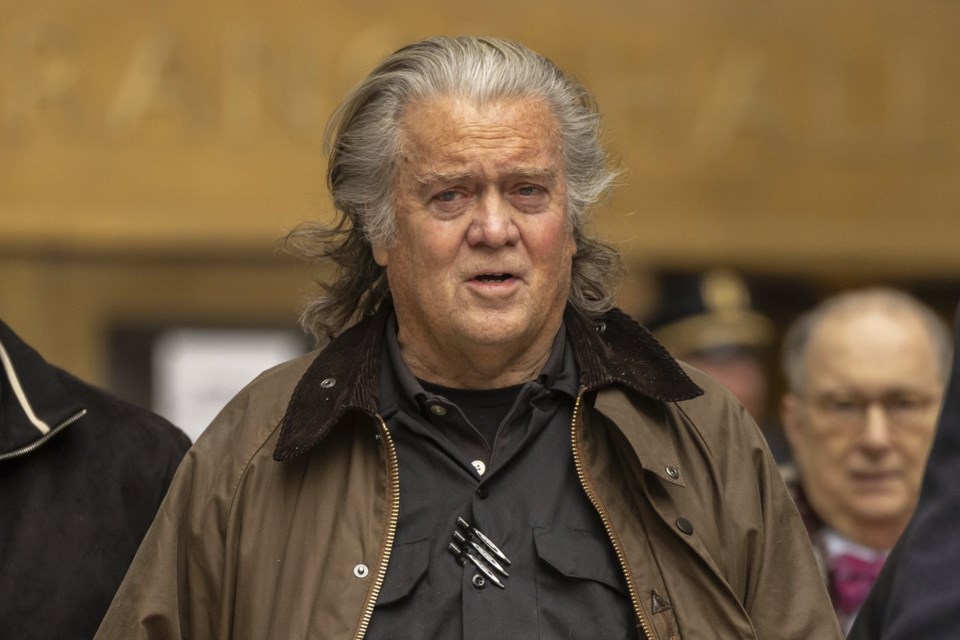NEW YORK (AP) ÔÇö Steve Bannon pleaded guilty on Tuesday to defrauding donors to on the U.S. southern border, ending a case the conservative strategist decried as a ÔÇťpolitical persecution.ÔÇŁ
Spared from jail as part of a plea deal, he left court saying he ÔÇťfelt like a million bucks.ÔÇŁ
Bannon, a longtime ally of President , pleaded guilty in state court in Manhattan to one count of scheme to defraud, a low-level felony. The case involved We Build the Wall, a non-profit that Bannon himself once suspected was a scam.
Bannon, 71, must stay out of trouble for three years to avoid additional punishment, including possible jail time. He also canÔÇÖt raise money or serve as an officer or director for charities in New York and canÔÇÖt use, sell, or possess any data gathered from border wall donors.
Bannon had been scheduled to go to trial March 4.
His lawyer, Arthur Aidala, said Bannon wanted to ÔÇťput up a fight,ÔÇŁ but opted to plead guilty after weighing how a jury in heavily Democratic Manhattan might judge him. Under the deal, prosecutors agreed to drop money laundering and conspiracy charges against him.
BannonÔÇÖs plea deal came just days after U.S. Attorney General Pam Bondi ordered the Justice Department to investigate what Trump called the ÔÇť .ÔÇŁ
Outside court, Bannon urged Bondi to immediately open criminal investigations into Manhattan District Attorney Alvin Bragg, whose office prosecuted him, and New York Attorney General Letitia James, who sued Trump over his business practices and is leading legal challenges to his administrationÔÇÖs policies. Both are Democrats.
Bragg ÔÇťcan call a grand jury at any timeÔÇŁ and ÔÇťset up criminal charges on the most bogus efforts,ÔÇŁ Bannon said. He called James the ÔÇťqueen of lawfareÔÇŁ and warned that Trump and his allies "ought to be worried about this out-of-control city.ÔÇŁ
Bragg and JamesÔÇÖ office didn't immediately respond to BannonÔÇÖs comments.
Bragg took up the case and charged Bannon with state offenses after Trump cut a federal prosecution short in the final hours of his first term in 2021. Presidential pardons apply only to federal crimes, not state offenses.
Bannon was charged with falsely promising donors, including some in New York, that all money given to would go toward erecting a wall along the U.S.-Mexico border. Instead, prosecutors alleged the money was used to enrich Bannon and others involved in the project.
The campaign, launched in 2018 after Trump fired Bannon as his chief strategist, quickly raised over $20 million and privately built a few miles of fencing along the border. It soon ran into trouble with the International Boundary and Water Commission, came under federal investigation and , the Republican whose policy the charity was founded to support.
ÔÇťThis resolution achieves our primary goal: to protect New YorkÔÇÖs charities and New YorkersÔÇÖ charitable giving from fraud,ÔÇŁ Bragg said in a statement. He added that "New York has an important interest in rooting out fraud in our markets, our corporations, and our charities, and we will continue to do just that.ÔÇŁ
Until recently, Bannon appeared set on taking the case to trial.
He hired new lawyers, including Aidala, and began plotting an aggressive defense strategy after Judge April Newbauer ruled prosecutors could show jurors certain evidence, including an email they say showed Bannon was concerned the fundraising effort wasnÔÇÖt legit.
ÔÇťIsnÔÇÖt this a scam? You canÔÇÖt build the wall for this much money,ÔÇŁ Bannon wrote in an email, according to prosecutor Jeffrey Levinson. He said Bannon went on to add: ÔÇťPoor Americans shouldnÔÇÖt be using hard-earned money to chase something not doable.ÔÇŁ
In January, BannonÔÇÖs lawyers filed papers asking Newbauer to throw out the case, calling it an ÔÇťunconstitutional selective enforcement of the law.ÔÇŁ The judge had been expected to rule on Tuesday before BannonÔÇÖs plea deal made the request moot.
Two other men involved in the We Build the Wall project, Brian Kolfage and Andrew Badolato, and were sentenced to prison. A third defendant, Timothy Shea, was convicted and also sentenced to prison.
Bannon went to prison in an unrelated case last year, serving four months at a federal lockup in Connecticut for defying a subpoena in the congressional investigation into the U.S. Capitol attack on Jan. 6, 2021. He was released in October.
___
Follow Michael Sisak on Twitter at and send confidential tips by visiting .
Michael R. Sisak, The Associated Press



